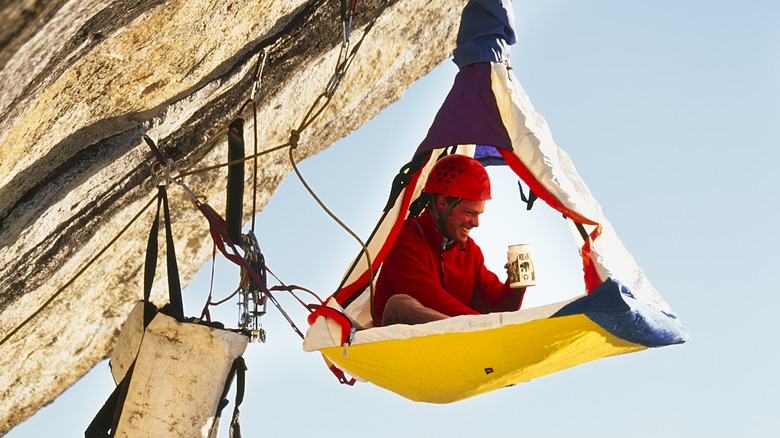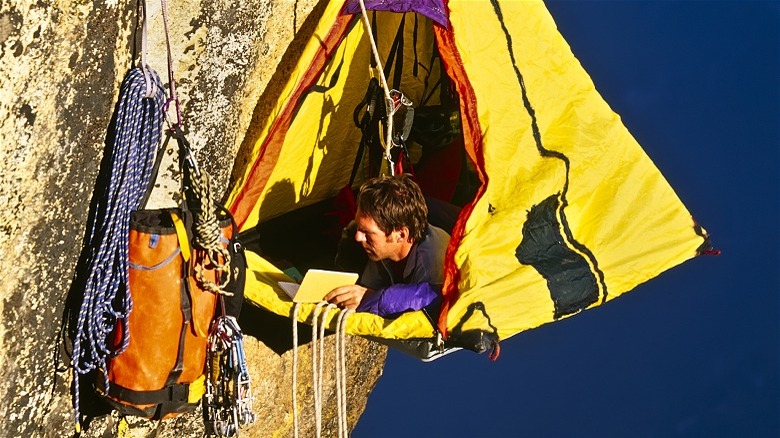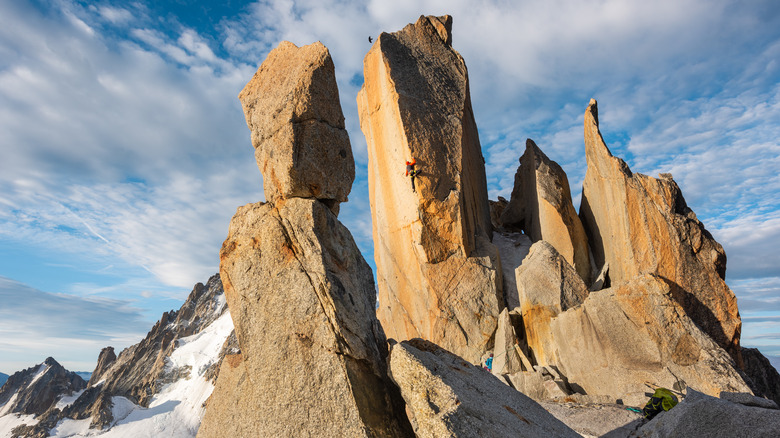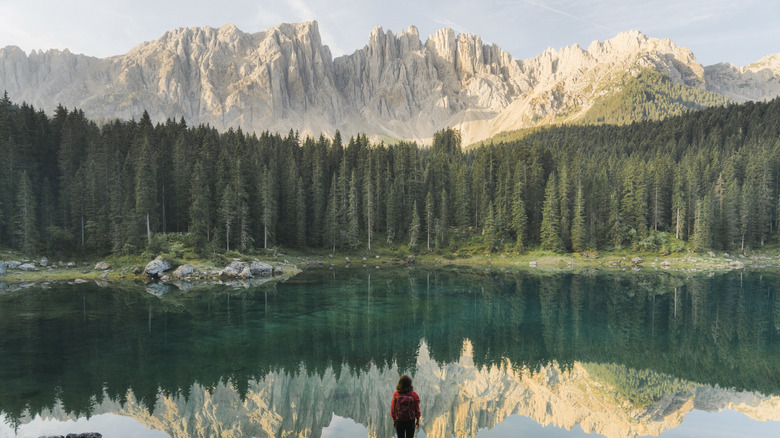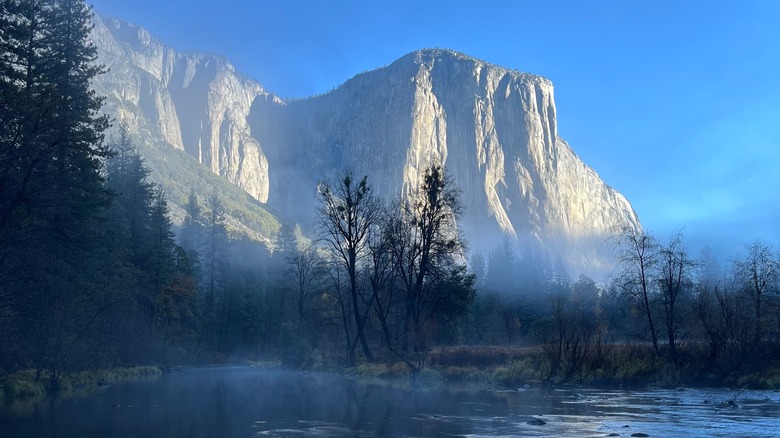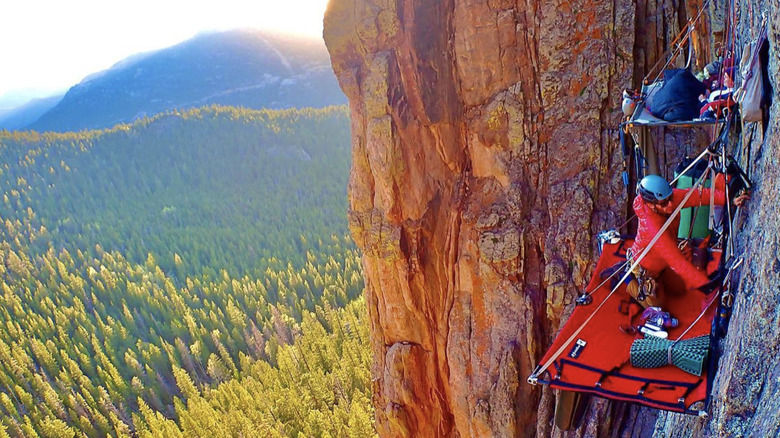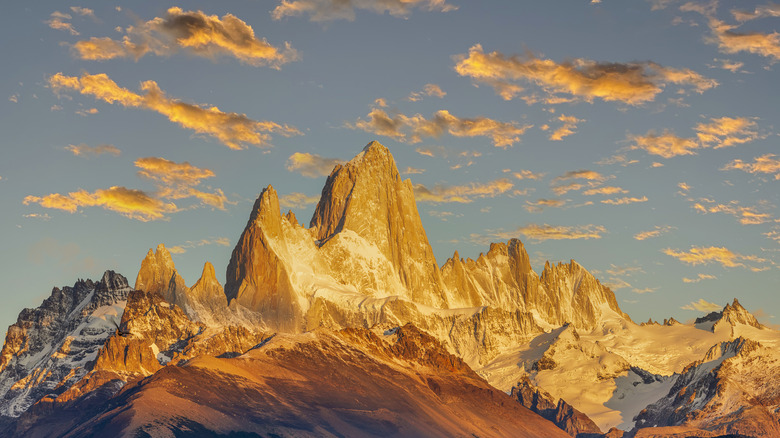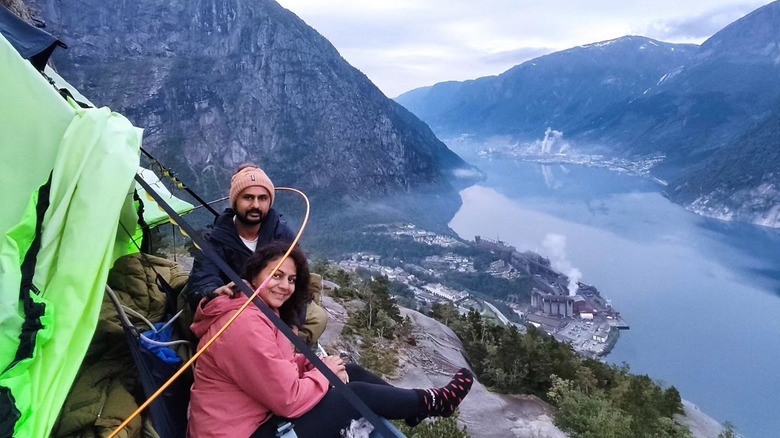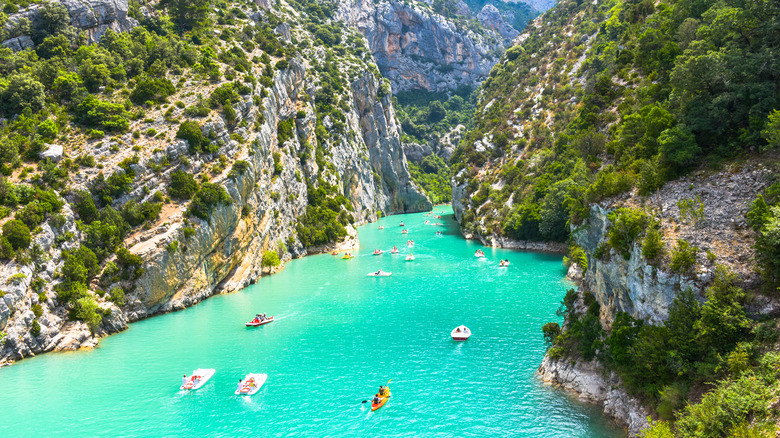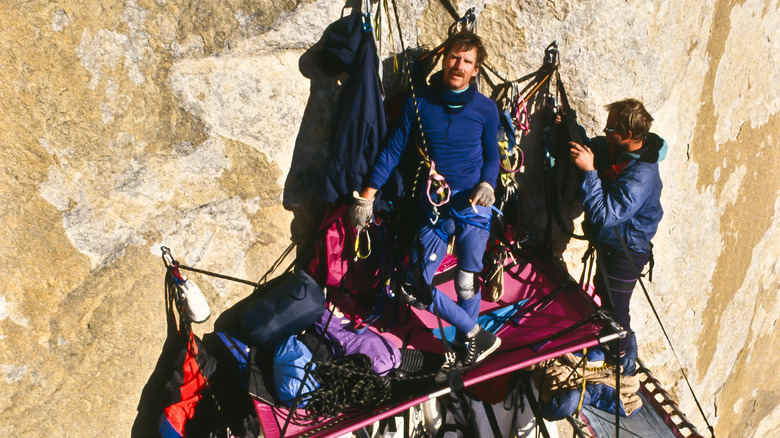10 Most Thrilling Cliff Camping Destinations Around The World
You're midway up a towering vertical cliff, thousands of feet off the ground. It's a straight drop. There's not a single ledge in sight. You're determined to reach the top, but night is falling. You certainly don't want to fall with it. Where do you sleep? In a portaledge (a.k.a. portable ledge), of course. Experienced climbers carry these lightweight, collapsible, waterproof tents inside their packs and know how to set up an impromptu campsite suspended from adjustable straps and hung from an anchor point by a locking carabiner. Climbers remain hooked to their harness, so they're not going anywhere even if they roll around at night.
Over the years, as portaledge technology has improved to withstand weather and gravity reliably, adventurous souls have sought out what some call cliff camping and others call completely unbelievable. Now, even climbing novices can shell out a couple of thousand dollars for an experienced guide to help them spend a night seemingly floating thousands of feet in the air. We sought out a mix of novice-friendly guided experiences centered around cliff camping and epic, world-famous cliffs on the top of every climber's list. Sorry to leave you on a cliffhanger, but before we get to the winners, we need to address the boulder in the room: Are you truly ready for this?
Who should cliff camp?
Cliff camping is polarizing: Some are horrified at the prospect and get vertigo just thinking about it, while others become dizzy with excitement. Here's an important rule: If this is your first time hearing about cliff camping, you are not ready to do it alone. It is an intricate process reserved for experienced climbers who can scale great heights and assemble a tent mid-air. Solo cliff camping requires perfect mastery of all of these skills.
We recommend a guided cliff camping experience first to see how it's done, feel what it's like, and learn about the best portaledge models to purchase. After that, aspiring cliff campers should practice assembling a portaledge from a tree that's a safe distance from the ground. Once this becomes second nature, start with a simple climb. Mountaineering websites like Mountain Project assign difficulty grades to each climb, so climbers will have a decent idea of what they're in for. After that, make sure to do it during clear, sunny weather.
The climbs below all have certified guides, so no experience is necessary. For many of them, climbers rappel down to a pre-assembled portaledge rather than climbing up and assembling it themselves. We emphatically suggest a few guided climbs, lots of assembly practice, and consulting with a physician before trying this alone. Even experienced climbers often bring a friend who knows what they're doing to help them assemble the tent, and the two sleep side by side.
Arête des Cosmiques, France
Guests may think for a moment they've woken up in heaven as they watch the sun illuminate the snow-capped peaks of Mont Blanc, the highest peak in Europe. But they're actually floating on a portaledge hanging from the Arête des Cosmiques, a 12,600-foot-tall mountain ridge in the Mont Blanc massif. IFMGA/UIMLA-certified guides will bring guests on a two-day hike through the popular Alpine wonderland, famous for its glaciers, ice caves, and indescribable views. Guests spend a day hiking to the cliff and have the option to rappel down to the portaledge near the top or do a guided climb up to it. Despite the substantial height, no prior climbing experience is necessary to embark on this magical cliff camping adventure, and all materials are provided.
When the night is over, guests can engage in more daredevil activities. Atop the Cosmiques lies the Aiguille du Midi, the famed peak accessible by cable car. Guests can enjoy another semi-floating experience inside the Step into the Void glass box, which boasts transparent glass walls that make guests feel as though they are walking over the towering mountains below them. Anyone craving more adrenalin can take a roller coaster through the mountains, go whitewater rafting, take trips into ice caves, or even paraglide over Mont Blanc. For a more sedate Mont Blanc viewing experience, the town of Chamonix, which hosted the 1924 Winter Olympics, offers 36 Michelin-starred restaurants and deluxe ski chalets.
Beyond the Edge, Australia
A cooler containing a gourmet breakfast rappels down in the Australian Alps while you watch the sun rise over a tumbling waterfall and towering mountains, suspended 984 feet in the air. That's Beyond the Edge, Down Under. Beyond the Edge, Australia's first and highest commercial cliff camping experience, takes adventurers to the top of the sheer cliffs of the North Wall of Mt. Buffalo Gorge, high in the Australian Alps of southern Victoria. Two expert guides will provide a comprehensive training session on rappelling and cliff ascents and then help guests rappel down into a pre-assembled portaledge. Guests will then enjoy a prepared dinner and breakfast in the portaledge as they marvel at a panoramic view of the forests, lakes, waterfalls, and mountains of Mt. Buffalo National Park.
The park, about a four-hour drive from Melbourne, provides 76,600 acres of Alpine wonderland to enjoy long after guests leave the portaledge. For a more stable lookout, guests can travel to the Echo Point viewing area, so named because voices echo. Nearby is the Mt. Buffalo Chalet, a former resort that still offers a terraced garden and occasional tour. Back on terra firma, guests can enjoy camping, swimming, and kayaking along the 37-acre Lake Catani and hiking through snow-gum forests containing 550 native species, including rare birds and adorable wombats.
Dolomites, Italy
One quick glance at these majestic peaks towering over lush Alpine meadows will instantly make it clear why they top nearly every list of cliff-climbing destinations around the world. The jagged, 11,000-foot limestone peaks of this UNESCO World Heritage Site in northeastern Italy are full of nooks and crannies and free of the ice and glaciers that make the cliffs of the Western Alps more challenging to climb. Because of their abundance of rock faces and climbs for every level, the Dolomites and Yosemite's El Capitan are often considered the two essential spots for every climber to prove their mettle.
Even though we couldn't find any tours that specifically mention portaledge camping in the Dolomites, several certified guides will help climbers set one up for multi-day climbs for every skill level. One of the most popular — and crowded — routes is via ferratas, the "iron paths" of stairs, cables, steps, and ladders initially developed during the First World War to help soldiers cross through the formerly impenetrable mountains. Other beginner routes include the 8,845-foot Sella Towers or the 9,278-foot Piz Ciavezes, while the nearly 11,000-foot "Queen of the Dolomites" Marmolada and the north face of the Cima Grande are considered extremely difficult. After an exhausting, exhilarating climb and camp, enjoy the bucolic delights of this fascinating region about two hours from Venice that blends Italian with Austrian alpine culture.
Dorset, England
Most of the destinations on this list will take campers high above mountains and forests. But travel to Dorset, along the 200-million-year-old fossil-strewn limestone cliffs, and campers will find themselves floating over a brilliant expanse of bright blue ocean. Rise and Summit offers campers the chance to sleep on a portaledge in the far south of England, hanging about 82 feet above the English Channel. A guide will help guests rappel down to a pre-assembled portaledge, where they will spend the night listening to the sound of gulls, guillemots, and crashing waves. In addition to Dorset, Rise and Summit offers guests the chance to cliff camp in one of four locations along Britain's breathtaking southeastern coast: North Devon, near Exmoor National Park; Pembroke, Wales, which boasts some of the best sea cliffs in the world, and Swanage, near the idyllic coastal village.
Dorset lies along England's spectacular Jurassic Coast, a 95-mile stretch of towering, bright white limestone cliffs that have been designated a UNESCO Natural World Heritage Site. Campers can walk along paths through endless bright green fields while marveling at blue skies, turquoise seas, and a number of unique rock formations at this underrated English destination. Don't miss the Old Harry Rocks, two huge white limestone rocks in the middle of the ocean, the circular, aquamarine Lulworth Cove crowned by the iconic Durdle Door rock arch, and the medieval ruins of Corfe Castle. Head to the idyllic seaside towns of Weymouth, Abbotsbury, and Lyme Regis for cozy country inns and pubs.
El Capitan, Yosemite National Park
Yosemite's El Capitan earns its stripes as "The Captain" of cliff climbing and camping. In 1958, Warren Harding was the first person to climb its 3,000 feet of sheer granite known as "The Nose," and it took him 45 days – quite a bit longer than the current average of 10 hours or the record of one hour, 58 minutes. Harding clipped a hammock to the mountain when night fell, also known as the world's first portaledge. In the following years, he improved this concoction with a single-point hammock he called the B.A.T., or "Basic Absurd Technology." Portaledge technology has substantially improved since then, but some might argue the description still applies.
El Capitan is a trendy climbing destination considered the Mt. Everest of cliff climbing due to Harding and popular movies about climbing it like "Free Solo" and "The Dawn Wall," named after one of its most challenging walls. Moreover, camping at the base of Yosemite isn't allowed, so cliff camping is the only option for multi-day climbs. Any climbers interested in giving the Dawn Wall (2500 feet), the 700-foot overhanging Shield Wall, or the 3,000-foot Dihedral Wall should definitely consider one of the many certified climbing guides before attempting this difficult cliff, which has claimed the lives of 31 climbers as of October 2023.
Estes Park, Colorado
For a long time, cliff camping was a means to an end — it was the only way for experienced climbers to get some much-needed shut-eye at the end of a grueling day of climbing a sheer vertical wall. But the Kent Mountain Adventure Center, based out of Estes Park just outside of Colorado's underrated Rocky Mountain National Park, was one of the first to realize that the thrilling novelty of cliff camping could be an end unto itself and offered some of the first cliff camping-specific experiences open to climbing novices.
Guests of any experience level can book a one-night stay dangling about 7,500 feet off the ground. They bring all their own gear, and after the guide confirms they have everything they need, they lead them to the top of another via ferrata (this is a common term on mountains, indicating a protected climbing area featuring cables and railings to prevent falls.) At the top, guests rappel down to their portaledge tent, where they enjoy a prepared dinner and breakfast while gazing out at miles of stunning mountains and forests. A guide spends the night staying in a separate portaledge.
More experienced rock climbers can try their hand at a number of climbs in the Estes Valley, including Lumpy Ridge, Big Thompson Canyon, and Emerald Lake. Everyone will find plenty to enjoy in the surrounding area, including Lake Estes, the quirky shops and restaurants in Estes Park, and Elk Fest, which celebrates the exuberant Elk Rut mating season.
El Chaltén, Argentina
Like Yosemite or the Dolomites, the collection of jagged cliffs towering over the town of El Chaltén in the Patagonia region of southwestern Argentina is at the top of any serious climber's bucket list. The majestic 11,000-foot Mt. Fitz Roy and the seven summits surrounding it are made of numerous ice-free rock walls of solid, high-quality granite that are a climber's dream. Nearby, the 10,200-foot-tall Cerro Torre is icier and trickier, which makes scaling it all the more enticing to seasoned climbers.
Only climbers with years of experience should consider trying to climb and camp on these mountains, which can take up to four days. Luckily, numerous guides offer supervised climbs that include portaledge camping. The famous Fitz Roy is one of the more popular climbs, and from the portaledge perch, climbers can marvel at the expanse of jagged cliffs and turquoise lakes that make up this fabled region.
The tours mainly start in El Chaltén, a centrally located town full of hostels, restaurants, and gear stores considered one of the central hubs of Patagonian mountaineering. In the summer months, fly from Buenos Aires to El Calafate, then embark on a three-hour bus journey to El Chaltén, Aonikenk, for "smoky mountain" due to the clouds swirling around the tops of the high peaks. Needless to say, the more than 260,000 square-mile Patagonia region at the southern tip of South America is a natural wonderland full of glaciers, fjords, penguins, and much more.
Ullensvang, Norway
For more fabulous fjords, head to the other corner of the world. Deep in the jagged west coast of Norway, Estangard Outdoor Experiences offers climbers the chance to marvel at an enchanting glacier, towering snow-capped mountains, and the narrow slice of deep blue water that cuts in between them from a portaledge dangling 1300 feet in the air. Fly into Bergen in the dreamy summer months, when the sun is out practically all night, and head about 2.5 hours inland to Ullensvang, a quaint village on the idyllic Sørfjorden. A guide will take guests on a quick hike to the top of the mountain and then entertain them with dinner and traditional Norwegian stories over a crackling bonfire. The guide will then help guests rappel down to a pre-assembled portaledge and guide them back up in the morning for breakfast.
At the bottom of the mountain, guests can enjoy the famed waterfront Hotel Ullensvang, a luxury hotel containing a cabin that once belonged to celebrated composer Edvard Grieg. In nearby Hardanger, marvel at the 500,000 trees of Norway's largest fruit orchard and consider a cider cruise through the fjords of this fertile region. If your climbing itch still isn't fully scratched, travel about an hour south to the 3600-foot Troll's Tongue, a tongue-shaped rock formation jutting out over spectacular fjord views. And if that's not enough, try scaling the infamous 5,577-foot Troll Wall, the highest vertical wall in Europe.
Verdon Gorge, France
Imagine coffee and a croissant while overlooking turquoise blue water in Provence. This may sound like a Riviera dream vacation, and in some ways, it is. But the only difference between this experience and a café in Nice is that you're suspended from a strap 1,148 feet in the air and overlooking the largest canyon in Europe. The tour group Escalade Verdon hosts cliff camping experiences right under the top of Escalès, the largest cliff in the Verdon Gorge canyon. Certified guides provide the portaledge and safety gear and help guests plan their preferred route, depending on experience. Guides will help climbers reach and assemble their portaledge for a truly breathtaking view over the jagged mountains and bright turquoise river running through the "Grand Canyon of Europe."
This 2300-foot deep, roughly 150-million-year-old canyon can certainly give the Grand Canyon in Arizona a run for its money. Unlike its American counterpart, it is a haven not only for hiking and climbing but for all varieties of water sports. Visitors flock to the river made bright turquoise from glacial minerals for rafting, kayaking, canoeing, paddleboarding, swimming, aquahiking, and perhaps of interest to cliff campers, cliff jumping. The river flows into the Lac du Sainte-Croix, which is surrounded by impossibly charming Provençal villages like Moustiers-Sainte-Marie, which contains the four-star, Michelin-starred Bastide de Moustiers Hotel and Restaurant and the Pont du Galetas, one of the best gorge viewpoints that isn't an Escalès portaledge.
Waldseilgarten Höllschlucht, Germany
Typically, a cliff camping experience contains just the camper, the portaledge, the cliff, and the wide open expanse below. But in one extraordinary spot buried deep in the Bavarian Alps, an entire forest of portaledges glows next to a thundering waterfall. Waldseilgarten, German for "Forest Ropes Course," is a magical resort specializing in unique camping experiences. Of course, guests can choose to sleep in a portaledge suspended over cliffs ranging from 3,280 to 6,562 feet above a verdant Alpine expanse.
But they can also choose to sleep in one of several portaledges dangling from the thick branches of mountaintop trees. This option offers the same panoramic views and novelistic thrill of cliff camping, but anyone afraid of heights will appreciate that the tree branches are actually just a few feet off the ground. They will also appreciate the added spectacle of the forest of illuminated tents at night, which almost look like a series of glowing bats, tiny bonfires, or a Faery Bower floating over the land of fairytale castles.
The fantasy doesn't stop there. In the winter, guests can bundle up and sleep inside an igloo that glows an almost bioluminescent blue. Or they can opt for a large teepee situated next to a waterfall flowing into a mountain stream. After the sun rises, the dreamscape continues. Waldseilgarten lies in Pfronten, at the center of a region full of storybook villages and grand castles, just 30 minutes from the famous Neuschwanstein.
Methodology
Assembling this list sometimes felt like an uphill climb. As you can see, we worked to include specialized cliff camping tours designed for any experience level, with cliffs too epic to leave out. However, even for the intense climbs, we made sure certified guides were always available to help inexperienced climbers. We also sought a diverse selection of locations, heights, views, and nearby attractions, from the mountains and the sea to the gorge and the trees to waterfalls and igloos.
